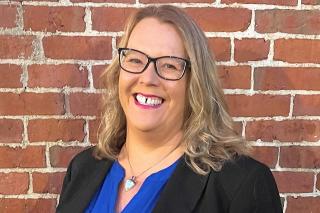Annmary Connor '23DSW is the Executive Director of Bread & Roses Housing (BRH) in Lawrence, MA, a community land trust that provides affordable homeownership opportunities for low-income individuals in Greater Lawrence. We spoke to Annmary about the importance of this work to revitalize overlooked neighborhoods and help first generation Americans build generational wealth.
"I think I was born to be a social worker. I've always been drawn to the field," says Annmary Connor, who completed her PhD in Social Work (DSW) at Simmons in the spring of 2023. "I grew up in a safe household where giving back to the community was very important. It was part of our faith to learn how to see beyond ourselves and see that the world does not revolve around us; it's much larger and everybody has different experiences."
After finishing her Master's degree, Connor searched for potential doctoral programs in social work or related healthcare fields. "I had the privilege of working with many Simmons students in their field placements," she says. "I loved the way Simmons taught their students. It gave me good insight into their doctoral program."
In October of 2022, during her doctoral program at Simmons, Connor began her new position as Executive Director of Bread & Roses Housing, which builds affordable housing for homeownership through a community land trust model. "We retain ownership of the land and sell the house with a 99-year lease of the land," Connor explains. "The owners are only taxed on the house, not the land. We also sell the houses at an affordable rate, 60-80% of the area median income as determined by HUD (U.S. Department of Housing and Urban Development)."
Bread & Roses has built homes in Lawrence, Haverhill, and North Andover. Most of these are brand new duplexes (two-family homes). "We focus on low-income families — many of them first generation Latinx — to help them build generational wealth," says Connor.
Connor notes that not everyone understands the value of generational wealth — particularly those that have it. "Unless you are reflective on your positionality as a White person, you won't realize how much generational wealth you have. This is not true for many minorities," she says, citing redlining practices that barred minorities from homeownership over generations, or restricted the areas in which they could purchase.
To buy a home through the program, clients have to have a steady income, a good credit score, and some savings. They put 3% down payment on the house, and a minimum of 1.5% has to be out of their own savings. The purchase price of their home is based on their income. They can live in the house indefinitely and it will remain affordable, allowing them to put money into savings and retirement funds. Clients attend a first-time homebuyer class, financial literacy class, and a post home buying class. Each client has a program manager who will intervene if they're behind on their mortgage.
"Since the organization was founded in 1987, none of their clients have suffered foreclosure. They can pass the house down from generation to generation, and in 99 years they can renew the land lease for another 99 years."
BRH builds homes and, in turn, communities. "Lawrence has a big Latinx population," says Connor. "It's a great multicultural, vibrant, rich community. Members of that community want to stay in their hometown, near their family and near their church. We make that possible." To do this, they often build homes in neighborhoods in need of investment. "We have a great development in Haverhill that's starting to turn that neighborhood around. The landlords are starting to spruce up the properties around our properties."
The hardest part, Connor says, is finding money to build the houses. "These aren't huge developments — just a small plot of land for one duplex — so we're not eligible for big financial resources that bigger developers can obtain. We often build one home at a time in a neighborhood." Of course, COVID-19 impacted the housing market, causing further complications. "People moved out of the city during COVID and drove up the area median income, but people working at the local Market Basket haven't had a jump in their income."
The price of land is also a barrier, with the expectations of middle and upper class homebuyers contributing to the issue. "[They] want that HGTV [Home & Garden Television] home and expect to have 2-3,000 square feet," she says, noting that these large homes require larger plots of land, making the land available for modest homes more difficult to find.
Reflecting on her experience at Simmons, Connor feels that the heightened awareness of her own positionality in the social and racial strata was an invaluable part of her training. "It's important, as a White woman, to understand how my Whiteness impacts those around me. I used to take that for granted. I have a powerful presence to begin with, and sometimes good leadership means stepping back and listening."
That introspection was a vital part of the leadership development she received at Simmons. "People need to understand that getting a doctorate is not easy. At Simmons, it's not just about acquiring knowledge, it's about self-reflection and self-awareness, as well as analyzing data and putting it into practice."
Photo courtesy of Annmary Connor

